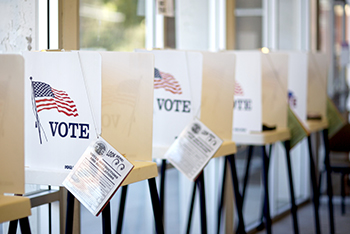 Oct. 1, 2014 – The November election is quickly approaching, and recent decisions from the U.S. Court of Appeals for the Seventh Circuit and the Wisconsin Supreme Court have created some confusion about whether Wisconsin’s voter identification (ID) law applies or does not apply.
Oct. 1, 2014 – The November election is quickly approaching, and recent decisions from the U.S. Court of Appeals for the Seventh Circuit and the Wisconsin Supreme Court have created some confusion about whether Wisconsin’s voter identification (ID) law applies or does not apply.
First, the voter ID law applies. A three-judge panel for the Seventh Circuit recently unblocked the Wisconsin voter ID law from taking effect, meaning individuals must show ID at polling places in order to cast a ballot.
This decision, combined with new “observer” rules promulgated by the Wisconsin Government Accountability Board (GAB), may make for interesting times at Wisconsin’s polling locations. This article provides a brief overview of important election law issues, including what is required to vote, and what to do when the right to vote is challenged.
Voting and Photo Identification
Wisconsin’s voter ID law had been blocked by court order until September 12, 2014, when a three-judge panel in Frank v. Walker effectively reinstated Wisconsin's photo identification law, which was enacted in 2011 and requires voters to show photo IDs at polling places in order to vote.
More In-Depth Discussion on Election Law Changes
On Oct. 7, 2014, Ann Jacobs will be presenting a two-hour webcast titled “Election Law for Lawyers: Registration, Voting & Observing,” sponsored by State Bar of Wisconsin PINNACLE®.
Webcast replays will take place Oct. 17, Oct. 22, Oct. 30, and Nov. 3.
Register now.
This ruling, combined with an earlier decision by the Wisconsin Supreme Court in League of Women Voters v. Walker, 2014 WI 97 (2014), means that voters will be asked for photo identification at the polls. This has generally been viewed as a surprising decision, thus causing confusion about the voting requirements.
With the law in effect, the vast majority of voters will be required to present photo identification in order to have their votes counted. Wis. Stat. section 6.79(2)(a) states that "each eligible elector, before receiving a serial number, shall state his or her full name and address and present to the officials proof of identification.”
What Is Valid “Proof of Identification”?
There are several acceptable forms of identification:
Wisconsin driver's license (expiration date of Nov. 6, 2012 or later);
DMV-issued identification card (expiration date of Nov. 6, 2012 or later);
Military identification (expiration date of Nov. 6, 2012 or later);
U.S. passport (expiration date of Nov. 6, 2012 or later);
Certificate of naturalization (issued on Nov. 4, 2012 or later);
Unexpired driving receipt or ID card receipt (the paper the DMV provides for your use as you are waiting for your license or ID to arrive in the mail);
Tribal identification card provided by a federally recognized Wisconsin Indian tribe;
Unexpired college identification card, with the following requirements: 1) must have an issuance date; 2) must have an expiration date within two years of the date of issuance; 3) must be signed by the student; and 4) the student must provide a separate document showing proof of current enrollment in the same college.
It is important to note that these photo identifications do not need to have a voter’s current address – they are only to prove the voter’s identity, not his or her residence. Also note that for many forms, they can be expired, provided they expired after the dates listed above.
Are There Any Exceptions To the Photo Identification Requirement?
Under Wis. Stat. section 6.79(6), “confidential electors” are excluded from the photo identification requirement. Confidential electors are persons who have been the victim of domestic abuse, sexual assault, or stalking who have asked for a confidential voter registration listing.
 Ann Jacobs (U.W. 1992) is the founder of Jacobs Injury Law and focuses her practice on personal injury, medical malpractice, and nursing home neglect and abuse cases. She is a frequent lecturer on many topics, including election law, and recently served as a panelist at a national symposium titled, “Crafting the Ideal Election Administration System.”
Ann Jacobs (U.W. 1992) is the founder of Jacobs Injury Law and focuses her practice on personal injury, medical malpractice, and nursing home neglect and abuse cases. She is a frequent lecturer on many topics, including election law, and recently served as a panelist at a national symposium titled, “Crafting the Ideal Election Administration System.”
 Emily Lonergan (Marquette 2011) is an attorney at Gimbel, Reilly, Guerin & Brown, LLP, practicing primarily personal injury and criminal defense law. Emily also volunteers her time for Wisconsin Election Protection, and other programs.
Emily Lonergan (Marquette 2011) is an attorney at Gimbel, Reilly, Guerin & Brown, LLP, practicing primarily personal injury and criminal defense law. Emily also volunteers her time for Wisconsin Election Protection, and other programs.
Ann Jacobs and Emily Lonergan are members of the Legal Coordinating Committee for Wisconsin Election Protection and help organize the volunteer lawyer effort throughout Wisconsin.
Under section 6.79(7), if a voter has been required to physically surrender his or her driver's license within sixty days of the election (usually due to a DUI), that individual may provide an original copy of the notice or citation in lieu of photo identification.
There are also exceptions for absentee voters who are “indefinitely confined,” as well as active military and permanent overseas voters. Absentee voting with photo identification is a separate topic not covered in this article.
What If I Don't Have a Photo ID?
Eligible voters should visit the Wisconsin Department of Motor Vehicles (DMV) and apply for a free voter identification card in advance of the election. They should bring their birth certificate and proof of residence to the DMV to apply.
Of note, voters must request that the ID be free for voting purposes, otherwise they may be charged a fee.
If eligible voters lack birth certificates or other required information, they may fill out a petition and the DMV will attempt to corroborate the required information in order to issue a voter ID. However, verifying a voter’s information is not a quick process. If you know individuals looking to utilize this method, they should petition as soon as possible in order to have the best chance of obtaining valid identification prior to November's general election.
What if I Can’t Get an ID or Don’t Want To Show One?
If an individual refuses or is unable to produce photo identification at the polls, he or she shall be provided with a provisional ballot.1 The ballot is then placed in a special envelope and held. The individual then has two choices:
He or she may show up at their polling place before 8 p.m. on Election Day, November 4 (Tuesday), and provide photo identification, at which point the ballot will be removed from the envelope and cast.2 Or, the voter may provide photo identification to the municipal clerk by 4pm on November 7 (Friday).3 If they do nothing, their ballot will not be counted.
Can I Still Register At the Polls?
Yes. These changes in the law have not changed the ability to register at the polls on Election Day.
In order to register at the polling site a voter must fill out a “voter registration application,” which will contain the voter’s current name, date of birth, address, and identification number (driver license number or ID card number or, if those are expired or the voter has neither, the last four digits of the voter’s social security number).
The voter will then have to sign the application in front of an election official, and provide proof of residence. Proof of residence can be many different documents, but all must have the person’s name, address, and be valid on the date of the election. Those documents include:
Current and valid Wisconsin driver’s license or ID, or DMV receipt of the same;
Any official identification card or license issued by a governmental body or unit in Wisconsin;
An employee identification card, but not a business card, issued by an employer in the normal course of business, which includes a photo (but recall that it must also include the individual’s current residential address);
A real estate tax bill/receipt for 2013 or 2014;
A residential lease containing the landlord’s name, the tenant’s name, the address subject to lease, the term, the rent, and the signatures of both the tenant and landlord;
A college, university, or technical school identification card with photo (but address not required), with either a tuition or fee payment receipt issued to the student no earlier than 9 months prior to the election, or a certified and current list of students who reside in university or college housing provided by the university or college;
A utility bill (gas, electric, water, sewer, phone, cell phone, cable, internet, etc.) for the period commencing not earlier than 90 days before Election Day;
Bank statement (must reflect an account where funds are deposited, not a credit card statement even if issued by a bank);
Paycheck or paystub documentation of direct deposit;
A governmental check or another document issued by a unit of government (whether the unit is federal, state, county, municipal, school, tribal, etc.). This may include: vehicle registration, BadgerCare/Medicare statements, Social Security statements, public school correspondence, federal student loan notices.4
A signed letter on public or private social service agency letterhead identifying a homeless voter and describing the residence for voting purposes.
Proof of residence documents can be provided electronically, meaning they can be displayed by cell phone, tablet or computer to voting officials.
Who Are Those People Watching Me and are They Allowed to Be Here?
Anyone is able to observe the election (except for candidates themselves). In fact, Wisconsin Election Protection provides nonpartisan observers at many polling sites throughout Wisconsin on Election Day, as well as trained, roving attorneys who are responsible for several wards.
While the law expressly permits observers (whether attorneys or not) to observe the polls, there are significant limitations on their behavior under Wisconsin Government Accountability Board, Rule 4:
Observers must follow instruction from the chief inspector at the polling site;5
Observers must check in;6
Observers must stand in a designated location for observers;7
The observer location will be not less than three and not more than eight feet from the check-in area and the voter registration area;8
Observers are permitted to view public documents, but may not touch the documents;9
No cameras or video;10
No voice calls;11
No electioneering.12
The right to observe does not include the right to interfere or obstruct voting in any manner. Observers who believe they have a valid challenge (and there are very few challenges permitted by law) must follow applicable law in making their challenges13. Failure to maintain decorum at the polls can result in observers being removed from the polling place.
Help! I Can’t Vote!
Wisconsin Election Protection (WEP) is a nonpartisan, non-profit coalition formed to help protect the vote. The coalition provides a hotline (1-866-OUR-VOTE) that connects voters to Wisconsin lawyers to answer any election questions and assist voters or others with voting issues.
WEP also fields lawyers as observers state-wide, as well as a “war room” staffed by experienced attorneys answering phone calls. It is part of the nation-wide Election Protection umbrella, organized under the Lawyers Committee for Civil Rights Under Law, and many other national organizations.
If you, a client, or anyone you know has difficulties voting or has election-related questions, please call the national hotline at 1-866-OUR-VOTE (1-866-687-8683) or visit WEP’s Facebook Page.
Endnotes
1 Wis. Stat. § 6.79(3)(b).
2 § 6.97(3)(a).
3 § 6.97(3)(b).
4 There are many additional documents that fall under this heading. See Proof or Residence for Voter Registration, Wisconsin Governmental Accountability Board.
5 Wis. Admin. Code GAB § 4.02(7).
6 § 4.02(2).
7 § 4.02(5).
8 Id.
9 § 4.02(12); § 4.02(13).
10 § 4.02(18).
11 § 4.02(15).
12 § 4.02(18).
13 § 9.02.
